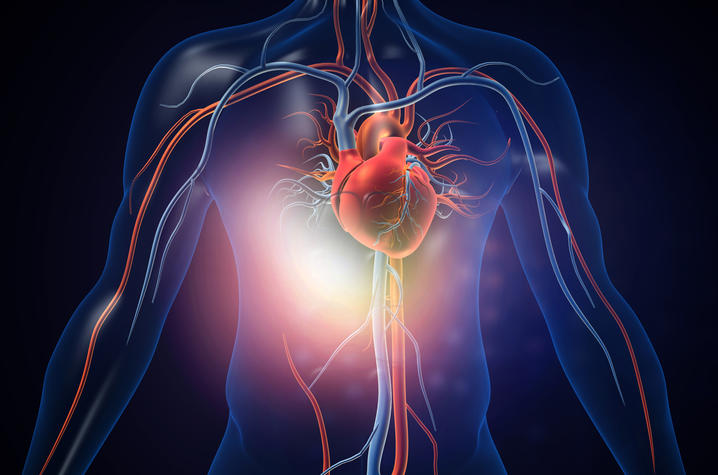Cardiovascular Research Spotlighted During Multiday Event

LEXINGTON, Ky. (Sept. 14, 2021) — What if there were a way to cure hypertension associated with obesity? University of Kentucky researcher Frédérique Yiannikouris, Ph.D., an assistant professor in the University of Kentucky College of Medicine's Department of Pharmacology and Nutritional Sciences, may be on track to find it.
Specializing in obesity, diabetes and cardiovascular disease research, Yiannikouris’ most recent research project is focused on a novel molecule, found in the fat, liver and kidney, that might help to cure hypertension associated with obesity.
Hypertension is another name for high blood pressure. It is normal for blood pressure to fluctuate during the day, but if it consistently stays high, you are considered hypertensive. High blood pressure means that blood is pushing too hard against artery walls. The force of this blood can damage the heart and the delicate inner lining of the artery walls. This damage can lead to many health problems.
Kentucky is one of the top five states in the nation for high adult obesity rates, with 36.6% of the population considered obese. The accumulation of fat is just one aspect of the incredibly complex disease. The metabolic changes that occur with obesity result in an increase in cardiovascular risk factors, like hypertension, poor bone quality and insulin resistance.
“If you can keep your blood pressure below 120 mmHg, the risk of cardiovascular disease drops dramatically,” Yiannikouris said. “In this context, identifying novel molecules and/or receptors involved in the control of blood pressure will allow us to better understand the link between obesity and hypertension and find novel therapeutic treatments for these highly prevalent diseases.”
Yiannikouris’ study focuses on the unique receptor, called the prorenin receptor (PRR), which she and her team believe could represent a potential therapeutic target in the treatment of cardiovascular disease. More specifically, they are studying the role of PRR in fat mass growth, in the accumulation of lipid in the liver and in the regulation of blood pressure, with a special emphasis on the difference between men and women.
“We recently found a new paradigm of crosstalk between adipose tissue and the liver, involving cholesterol, triglyceride and PRR,” she said. “Interestingly, we found that PRR contributes to lipid stability and that PRR can also be separated into a soluble form, called sPRR. This soluble form can induce an increase in blood pressure during the development of obesity.”
Both hyperlipidemia and hypertension are risk factors in cardiovascular disease. Even with antihypertensive treatment, the mortality rate is higher in patients who are hypertensive taking anti-hypertensive drugs than in a population of people with normal blood pressure. Yiannikouris said despite a wide range of available treatments, a significant number of patients have resistant hypertension.
“Understanding the mechanism by which PRR contributes to dyslipiedemia and hypertension will provide critical insights to develop new drugs targeting PRR and/or its soluble form," Yiannikouris said. "This can, in turn, result in manageable blood pressure, when combined with sustainable lifestyle changes."
*****
Yiannikouris’ research program is just one example of the type of research projects presented during the 2021 Cardiovascular Research Day, held in conjunction with the Fredrickson Lipid Research Conference. The multiday event celebrates innovative research in cardiovascular health. It is hosted by the University of Kentucky Saha Cardiovascular Research Center and the UK Gill Heart & Vascular Institute. The conference was the first in-person scientific conference in the field of lipid and lipoprotein metabolism and cardiovascular disease in nearly two years.
With 250 attendees from UK and nearly 40 other universities, the event showcased a wide variety of research activity from scientists and researchers, from trainees to prominent senior scientists.
After opening remarks by Alan Daugherty, Ph.D., director of the UK Saha Cardiovascular Research Center, several distinguished speakers presented their research. Steven Steinhubl, M.D., the director of Digital Medicine and an associate professor of genomic research for Scripps Research Translational Institute, presented “Healthcare Transformation and the Need for More Unreasonable Clinician-Researchers.”
Elizabeth McNally, M.D., Ph.D., the director of the Center for Genetic Medicine at Northwestern University Feinberg School of Medicine, was honored with the UK Gill Heart & Vascular Institute Outstanding Contributions to Cardiovascular Research award. She presented “The Genetic Landscape of Heart Failure.”
Katherine Gallagher, M.D., an associate professor of surgery, Section of Vascular Surgery, and Microbiology and Immunology at the University of Michigan, was awarded the UK Gill Heart & Vascular Institute Early Career Award. She presented “Epigenetics in Vascular Disease.”
Judged poster sessions concluded with an awards ceremony recognizing the best presentations.
The event was made possible by support from the UK Saha Cardiovascular Research Center, the UK Office of the Vice President for Research, the UK Cardiovascular Research Priority Area and the Gill and Saha foundations.
As the state’s flagship, land-grant institution, the University of Kentucky exists to advance the Commonwealth. We do that by preparing the next generation of leaders — placing students at the heart of everything we do — and transforming the lives of Kentuckians through education, research and creative work, service and health care. We pride ourselves on being a catalyst for breakthroughs and a force for healing, a place where ingenuity unfolds. It's all made possible by our people — visionaries, disruptors and pioneers — who make up 200 academic programs, a $476.5 million research and development enterprise and a world-class medical center, all on one campus.




